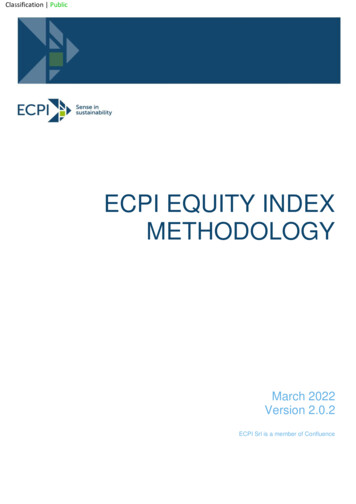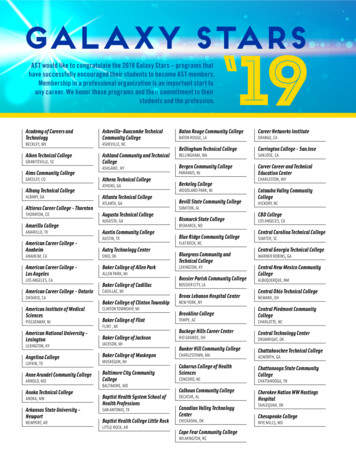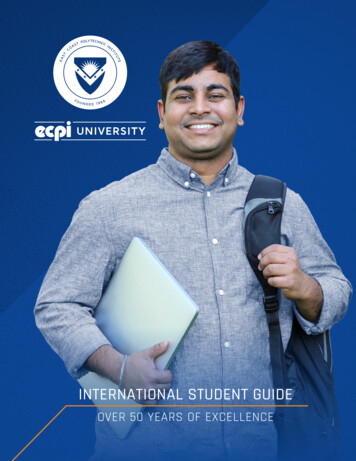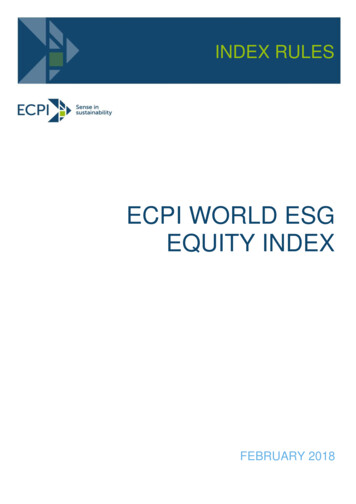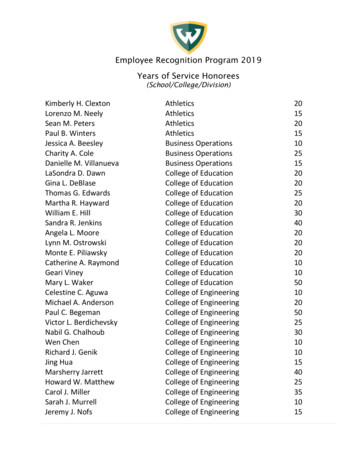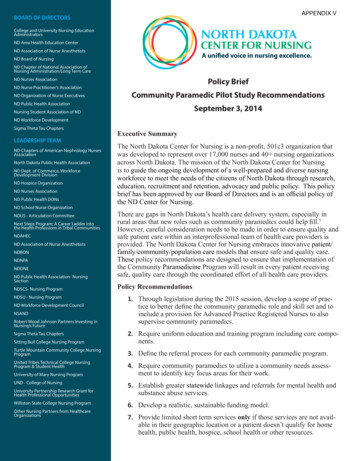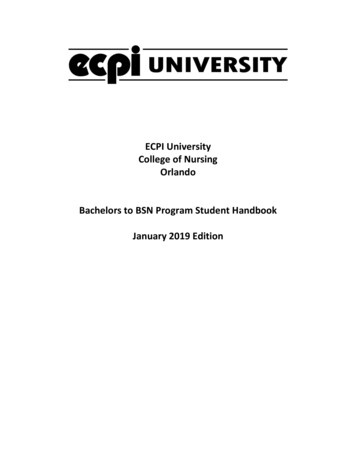
Transcription
ECPI UniversityCollege of NursingOrlandoBachelors to BSN Program Student HandbookJanuary 2019 Edition
TABLE OF CONTENTSWELCOME FROM THE B-BSN PROGRAM DIRECTOR/DEAN . 4USE OF THE NURSING HANDBOOK . 5CURRICULUM . 5MISSION STATEMENT AND CORE VALUES OF ECPI UNIVERSITY . 5EXCELLENCE IN ACADEMICS . 5COMMITMENT TO STUDENTS . 5PROFESSIONALISM IN ACTION . 6INNOVATION IN EDUCATION . 6PURPOSE OF THE B-BSN PROGRAM . 6PROGRAM DESCRIPTION . 6PROGRAM OVERVIEW . 7PHILOSOPHY OF THE B-BSN PROGRAM. 7ORGANIZING FRAMEWORK FOR THE B-BSN PROGRAM. 9B-BSN STUDENT LEARNING OUTCOMES . 10B-BSN CURRICULUM . 12ADMISSION REQUIREMENTS . 13GENERAL STUDENT POLICIES . 15NON-DISCRIMINATION POLICY . 15STUDENTS WITH DISABILITIES . 15ESSENTIAL FUNCTIONAL ABILITIES . 15TUITION, TUITION REFUND POLICY, AND FINANCIAL AID . 16Tuition . 16Expenses . 16Tuition Refund Policy . 16Financial Aid. 16HONOR CODE . 16ONLINE IDENTIFICATION PROCESS . 17PLAGIARISM POLICY . 17STUDENT ELECTRONIC COMMUNICATIONS POLICY . 19ACADEMIC AND GRADUATION REQUIREMENTS . 19GRADING LEGEND . 20HONORS. 21DRUG CALCULATION TESTING . 21WITHDRAWAL FROM A COURSE . 21PROGRESSION POLICY. 21ATTENDANCE POLICY. 22CLINICAL/LABORATORY TIME . 23CLINICAL, LABORATORY, AND SIMULATION ATTIRE AND REQUIREMENTS. 24STANDARDS OF PROFESSIONAL BEHAVIOR AND CONDUCT IN A CLINICAL SETTING . 25CLINICAL SAFETY . 26CLASS SCHEDULING/HOURS OF OPERATION . 27STUDENT BEHAVIOR AND EXPECTATIONS . 27LATE ASSIGNMENT POLICY . 28Page 2 of 35
EXAM AND TESTING POLICY .2829EXAM REVIEWS . 30COMPUTERIZED COMPREHENSIVE EXAMINATION . 30PREGNANCY . 30COURSE/PROGRAM WITHDRAWALS . 31STUDENT PARTICIPATION IN GOVERNANCE. 31STANDARDS OF PROFESSIONAL BEHAVIOR . 31STUDENT ADVISING . 32GRIEVANCES AND COMPLAINTS . 32GRADE APPEALS . 33ACADEMIC, JUDICIAL, AND FINANCIAL REVIEW BOARDS . 34STUDENT NURSES’ ASSOCIATION . 34APPENDIX: ACKNOWLEDGEMENT OF REVIEW OF ABSN STUDENT HANDBOOK . 35MAKE-UP EXAMINATIONS .Page 3 of 35
Welcome from the Bachelors to BSN Program Director/DeanDear New Bachelors to BSN Student,I am pleased you decided to join us at ECPI University, College of Nursing – Orlando’s Bachelorsto BSN Program. ECPI University began in 1966 as a technology school. Now, the University isaccredited to award the master’s, bachelor and associate degrees, and diplomas, for its variousprograms. All ECPI University programs are related to unique careers in technology, business,and the health sciences. The College of Health Science offers programs in nursing (AAS, BSN,and MSN), practical nursing and medical assisting, among others. More information on thecollege, ECPI University, and campus administration is available in the college catalog that canbe accessed via the World Wide Web.The Bachelors to BSN (B-BSN) program began in 2016 and was designed to meet the needs ofindividuals with a prior bachelor’s degree who want to secure a second bachelor’s degree innursing. This B-BSN Program Student Handbook will provide a review of the program’s mission,philosophy, outcomes, and curriculum plan. The Student Handbook also provides access to thepolicies and materials needed for your success.Again, I look forward to working with you as you strive to achieve your educational goals.Please feel free to contact me concerning any questions or suggestions for improvement.The B-BSN nursing program is accredited by the Commission on Collegiate Nursing Educationlocated at One Dupont Circle NW, Suite 530, Washington, DC 20036-1120, (202) 887-6791.Best regards,Dr. Anthony W. Pennington Ed.D, MBA, MSN, RN, CNEBachelors to BSN Program Director/DeanOrlando/Lake Mary Campus(407) 562-9082apennington@ecpi.eduPage 4 of 35
Use of the Nursing HandbookThis Student Handbook is representative of the B-BSN program’s standards and expectations.Each B-BSN student is expected to read, become knowledgeable, and comply with the contentsof this handbook. Students are responsible for information in the Student Handbook as well asthe ECPI University Catalog. It is recommended that students frequently refer to this handbookand the ECPI University Catalog for guidance and clarification of policies and expectations.CurriculumECPI University Catalog Website: http://ecpi.smartcatalogiq.com/Mission Statement: ECPI University provides a student-centered learning environment thatpromotes the enhancement of each student’s professional and personal life through education.Core ValuesECPI University is a private, multi-campus university founded in 1966 that operates in Virginia,North Carolina, South Carolina, Florida, and globally through the online delivery of its programs.The University has a compelling history, and our success is dependent upon the trust andconfidence we have earned from students, employees, and the communities in which weoperate. We deliver high quality education and student services and we are committed to thefollowing four Core Values.Excellence in academics Curriculum designed to foster life-long learning and educational excellence byreinforcing critical thinking, teamwork, problem-solving and communication skills.Industry-relevant programs maintain rigorous academic standards and arecomplemented by robust student support services.Hands-on, applied learning complements a strong theoretical foundation that preparesour graduates for the workplace.Qualified faculty members are academically credentialed and enrich the classroomexperience with their industry experience.Commitment to students Selective admissions process ensures that incoming students make informed decisionsregarding their educational investment and are prepared for postsecondary education.Dedicated professionals support the student experience and facilitate the achievementof individual student success.Meaningful internship experiences and opportunities for graduate employment areavailable as a result of our long-standing employer partnerships.Rigorous institutional effectiveness process promotes continuous improvement of theUniversity.Page 5 of 35
Professionalism in action Professional appearance, punctuality, attendance, and other behaviors that areappropriate to professional environments are valued and reinforced.Professional, civic, and ethical behaviors are promoted through the examples set byfaculty and staff.Student-centered learning environment simulates the workplace and encouragescollaboration with diverse groups to accomplish common goals.Opportunities for students to demonstrate professionalism by participating in on-siteemployer interviews, networking, and professional events including career fairs.Innovation in Education Extensive use of technology is encouraged to enhance each student’s universityexperience.Convenient, year-round schedules allow graduates to complete their programs in atimely manner.Input is routinely sought from the dynamic communities we serve.Multiple approaches are encouraged to reach educational outcomes and maximizestudent success.Purpose of the B-BSN programThe purposes of the B-BSN program are to provide undergraduate students with the (1) abilityto practice professional nursing as a generalist, and (2) academic foundation necessary topursue graduate education. The BSN program is dedicated to providing educationalopportunities for qualified students from diverse backgrounds in caring for individuals, familiesand communities and preparing graduates for the practice of registered professional nursing ina variety of health care settings. A foundation for life-long personal and professional learning isbuilt upon a broad base of liberal arts and sciences, humanities, and nursing theory to assiststudents develop ethically reflective professional nursing skills that uphold the ideals of today’shealth care delivery system. Through evidence-based clinical decision making in nursingpractice and the development of leadership skills, the professional registered nurse will beeducated to service and benefit a multicultural society across the lifespan.Program DescriptionThe Bachelor of Science in Nursing Degree provides an opportunity for baccalaureate preparedstudents furthering their education and careers, and serves the community and our society bymeeting the need for increased numbers of highly skilled and knowledgeable nursingprofessionals. ECPI University’s College of Nursing has created a B-BSN program that allowsstudents to acquire the essential skills and knowledge needed to meet the preventative andrestorative needs of patients. At this institution, students can learn both the art and science ofnursing.Page 6 of 35
The hands-on laboratory environment on our campus allows students to work with advancedsimulation technology, applying what students learn on campus before beginning clinicalrotations and throughout the curriculum.Program OverviewThe mission of the University and the B-BSN program is to offer a quality educational programthat provides its graduates with the educational foundation and skills necessary to achieveprofessional success in the field of nursing.The University is committed to providing quality nursing education with the goal of developingclinical leaders with the ability to advance and promote the health of the diverse populationswithin the communities they serve, advocate on behalf of their clients, achieve and maintaintheir clinical competency, and provide service to the community and the profession.The members of the faculty and administration of the University are dedicated to achieving theUniversity’s and the B-BSN program’s mission.Philosophy of the B-BSN ProgramThe faculty members of the B-BSN program believe that:Baccalaureate nursing education is a basic preparation for professional nursing practice, andestablishes the foundation for life-long learning. The faculty members believe that thebaccalaureate graduate is a generalist, prepared to provide clinical leadership in theassessment, planning, delivery, and evaluation of health care for individuals, families, andcommunities.The curriculum is structured to enable the student to demonstrate that they have developedan understanding and mastery of baccalaureate-level nursing and related concepts as theyprogress through their educational experience. Related concepts emphasized in the nursingcurriculum include ethical decision-making, critical thinking, effective communication,leadership, and management.As envisioned by the faculty members of the University, the nursing paradigm includes:Person. Each person is a unique being with basic rights and choices who experiencesmultiple stressors from their continually changing internal and external environments withvarying degrees of adaptation. The ultimate goal that a person has is to find, establish, andmaintain balance with health. Clients of nursing care are composed of individuals, families,groups, and communities with diverse backgrounds, sharing common goals and values.Perceptions, attitudes, values, and goals are influenced by culture, race, spirituality, age,gender, and abilities.Environment. The environment is a complex, open system existing in a dynamic state ofchange. Economic, political, environmental, and technological factors exert their effects onsociety. The nurse promotes an environment in which the person’s needs may be met,Page 7 of 35
while respecting individual differences related to values, customs, and responses to lifeexperience.Health. Health is regarded as dynamic and multidimensional, with physical, mental,spiritual, and social components that are all interrelated on the wellness-illness continuum,varying from a high level of wellness to varying degrees of illness. Health is influenced byboth internal and external factors to the individual’s optimal level of functioning. Whenadaptive abilities are inadequate or stressed, the individual moves on the wellness-illnesscontinuum toward a lower level of functioning. All people have the inherent right to makeinformed decisions regarding their health care, including self-determination.Nursing. Nursing is both an art and a science. Professional nursing provides comprehensivehealth care services to clients in an effort to support them in attaining their optimal level ofindependence and wellness through the promotion, maintenance, and restoration ofhealth. The role of the nurse is multifaceted, conceptualized in three primary categories:provider of care, coordinator of care, and member of the profession. Nursing education isan interactive process, allowing the adult learner to incorporate previously learnedknowledge, building a foundation for providing holistic, outcomes-oriented care. Theprofession works collaboratively with other members of the health care interdisciplinaryteam to facilitate optimal client outcomes. The faculty believes the baccalaureate degree isthe professional degree for nursing, providing the groundwork for the graduate degree.Learning. Faculty members of the University believe baccalaureate education in nursing isthe basis for professional practice as a nurse generalist, and offers preparation forprofessional development and life-long learning. Baccalaureate nursing education, basedupon a liberal arts education, is the synthesis of knowledge from a variety of disciplines,including humanities, social, behavioral, and natural sciences. Learning is a collaborativepartnership between the student and the faculty member, promoted by critical thinking,problem-solving, and effective decision-making. Learning occurs in a variety of settings, witheach student responsible for maximizing his or her own experiences. Each student hasunique life, educational, and work experiences and therefore, has individual learning needs.Outcome assessments quantitatively and qualitatively measure achievement ofprogrammatic goals.Page 8 of 35
Organizing Framework for the B-BSN Program:The following diagram represents the organizing framework of the B-BSN program. Theprogram recognizes a nursing paradigm that includes person, environment, health, nursing, andlearning. These five components provide the basis for the program outcomes.PersonHolistic nowledge (Artsand Sciences)Lifelong ion ofhealth outcomesApplication ofresearchLeadershipManagementFramework DescriptionThe B-BSN program at ECPI University is committed to produce baccalaureate prepared nursegraduates that exemplify an effective professional nurse. To this end, the organizationalframework was developed based on the program’s philosophy and the essentials of nursingeducation set forth by the American Association of Colleges of Nursing (AACN, 1998, 2008).Included in the B-BSN program’s philosophy are several important factors consideredfundamental to nursing education. The program believes that the curriculum should bedesigned to instill professional values and value-based interventions in nursing practice, and itshould promote teaching and learning as life-long interactive processes. Moreover, theimportance of effective critical thinking, clinical competence, accountability, and a commitmentto the value of caring are also upheld. These elements of the curriculum are maintained inaccordance with the concepts that AACN has recognized as essential to professional nursingeducation.Page 9 of 35
The concepts identified by the AACN as essential to professional nursing education are: care ofthe sick in and across all environments, health promotion, and population-based health care.These aspects of practice are said to aspire from “nursing knowledge, theory, and research”and they result in a discipline of nursing that encompasses decisive nursing roles. These rolesare considered to be critical to effective, professional nursing practice and are identified asfollows: providers of care, designers and managers, coordinators of care, and members of aprofession.The five major concepts identified by the B-BSN program are those of person, environment,health, nursing, and learning. The characteristics exhibited in each concept are supported bythe program objectives. These objectives are apparent in specific courses and are upheldthroughout the curriculum in the program.B-BSN STUDENT LEARNING OUTCOMESThe curriculum leading to the Bachelor of Science in Nursing degree is designed to prepare aprofessional nurse who should be able to demonstrate the ability to:1. Provide holistic, safe, competent patient care by applying the nursing process andevidence-based practice to manage the health care needs of culturally diverseindividuals, families, groups, and communities (BSN Essential VII, IX: QSEN Competency:Safety).2. Synthesize and apply knowledge from the humanities, the arts and letters, the socialand natural sciences as a basis for clinical reasoning and decision-making in nursingpractice (BSN Essential I).3. Effectively communicate using written, verbal and electronic methodologies (BSNEssential IV, VI; QSEN Competency: Informatics).4. Collaborate as a member of the interdisciplinary health care team, in partnership withthe individual, family, group, or community, to promote health and wellness, preventdisease, and to influence health care delivery (BSN Essential II, VI, VII; QSEN:Competency: Teamwork & Collaboration).5. Apply theories of nursing, patient teaching, leadership and management, and legal andethical principles to promote optimal care delivery with nurse-sensitive qualityindicators (BSN Essential II, VIII; QSEN Competency: Patient-Centered Care, Teamwork &Collaboration, Evidence-Based Practice, Quality Improvement, Safety, and Informatics).6. Contribute to the enhancement of nursing practice through the delivery ofcompassionate care, the evaluation of health outcomes, and the application of researchto practice (BSN Essential III; QSEN Competency: Patient-Centered Care, QualityImprovement, and Safety).7. Actively participate in the role of a professional nurse through practice, self-care,leadership and lifelong learning across the continuum of care (BSN Essential VIII; QSENCompentency: Evidence-Based Practice, Quality Improvement, and Informatics).Page 10 of 35
8. Apply knowledge of health care policy, finance, and regulatory environments toadvocate for the provision of safe and equitable nursing care (BSN Essential V; QSENCompetency: Patient-Centered Care, Teamwork & Collaboration, Quality Improvement,and Safety).Page 11 of 35
Bachelors to BSN CurriculumQuarter 1CourseNumberCourse NameCredits(theory/lab)*Clinical/labhours**NUR 311Pathophysiology40NUR 312Pharmacology40NUR 313Essentials of Nursing Practice50NUR 315Health Assessment Across the Lifespan5 (4 1)2 (24)NUR 316Essentials of Nursing Practice Clinical39 (108)Course NameCredits(theory/lab)*Clinical/labhours**NUR 322Nursing Care of the Adult Clinical412 (144)NUR 326Nursing Care of the Adult60NUR 328Public Health Nursing30NUR 329Public Health Nursing Clinical13 (36)NUR 332Topics in Professional Nursing30NUR 333Pharmacological Applications20Course NameCredits(theory/lab)*Clinical/labhours**NUR 433Nursing Care of Women and Children Clinical39 (108)NUR 436Mental Health Nursing Clinical26 (72)NUR 437Nursing Research30NUR 438Nursing Care of Women and Children50NUR 439Mental Health Nursing40Course NameCredits(theory/lab)*Clinical/labhours**NUR 445Professional Leadership40NUR 446Nursing Care of the Older Adult40NUR 447Nursing Care of the Older Adult Clinical13 (36)NUR 448Transition to Practice412 (144)NUR 449Senior Seminar40NUR 460Clinical Applications12 (24)Quarter 2CourseNumberQuarter 3CourseNumberQuarter 4CourseNumberPage 12 of 35
Admission RequirementsECPI University’s Admission, Progression, and Graduation Committee (“APG Committee”) isthe decision-making body that determines a prospective student’s eligibility for admission,reviews students’ progression issues and considers readmission requests.In determining an applicant’s eligibility for admission, the APG Committee will consider,among other factors, the applicant’s overall grade point average, overall science grade pointaverage, and application materials. The APG Committee will accept students for admission ona space available basis. Applicants are not required to be a licensed Registered Nurse in orderto be eligible for admission to the program. Nursing is a limited access major, which mayresult in qualified applicants not having the opportunity to enroll in the Bachelor of Science inNursing program.To be considered for acceptance, an applicant must do the following: Execute an Application for Admission and satisfy all prerequisites prior to the startdate of the Program. Have earned a Bachelor of Science or a Bachelor of Arts degree from a regionallyaccredited institution, graduating with at least at 2.50 Grade Point Average (GPA). Anofficial transcript is required as part of the application package. Applicants must have successfully completed all prerequisite courses, with no morethan two being allowed to be in progress at the time of application. A scienceprerequisite GPA of at least 2.75 is needed to apply to the program. Students notmeeting the GPA requirement may be considered for admission after review by theAPG committee. See prerequisite courses listed below. Present two letters of reference, including one from an academic source. Submit a résumé or curriculum vitae. Submit an essay as part of the application package, addressing the applicant’s desireto pursue a baccalaureate degree in nursing, including the rationale for choosing thisprofessional pathway. Completed FDLE/FBI criminal background checksThe components of the background check include two parts: A background check done online through VerifiedCredentials.com. A Level II Criminal Background Check from the Florida Department of LawEnforcement and the Federal Bureau of Investigation. Contact the Universityto have a FDLE / FBI fingerprint card to be sent to you. All applicants areadvised to begin the process well in advance of submitting the applicationpackage to the University. Your application cannot be processed withoutthese background check results.Must make satisfactory financial arrangements to provide for complete payment ofall amounts expected to be due to the institution for tuition and fees. Thisrequirement may include, but is not limited to, the completion of credit applications,Page 13 of 35
financial aid applications and forms (if the applicant wishes to apply for financial aid),and the execution of promissory notes or other documents necessary to obtain therequisite financial aid or other financial assistance. Take the Test of Essential Academic Skills (TEAS) earning a composite score of at least70%.Additionally, applicants for the Bachelor of Science in Nursing program may be required tohave a personal interview by the Campus President, Program Director/Dean, or his or herdesignee, either in person or by phone.Requirements for entrance once a student is accepted to the Bachelor of Science in Nursingprogram:To be admitted, an applicant who has been accepted must satisfy the admissionsrequirements as follows:1) Take a tour of the campus and execute an Enrollment Agreement.2) Attend an orientation or obtain a waiver of the requirement to attend an orientationfrom the Campus President/Dean.3) Meet the health requirements imposed by the clinical agencies, as set forth in (a)through (f):1. Health Form: Have a health form completed by a licensed provider (MD,APRN, or PA).2. MMR (Measles, Mumps, Rubella): Provide documentation of twoimmunizations or positive titer.3. DT (Diphtheria/Tetanus): Provide documentation of immunization within thelast ten (10) years.4. Varicella (Chicken Pox): Provide documentation of satisfactory titer orimmunization. History of disease does NOT meet this requirement.5. Hepatitis B: Provide documentation of a completed Hepatitis B vaccineseries.6. Mantoux Tuberculin Skin Test: Be free of active (contagious) tuberculosis andprovide documentation of a recent Mantoux tuberculin skin test using thetwo-step method conducted within the last 12 months. (Students will als
TUITION, TUITION REFUND POLICY, AND FINANCIAL AID . South Carolina, Florida, and globally through the online delivery of its programs. The University has a compelling history, and our success is dependent upon the trust and . As envisioned by the faculty members of the University, the nursing paradigm includes: Person.


